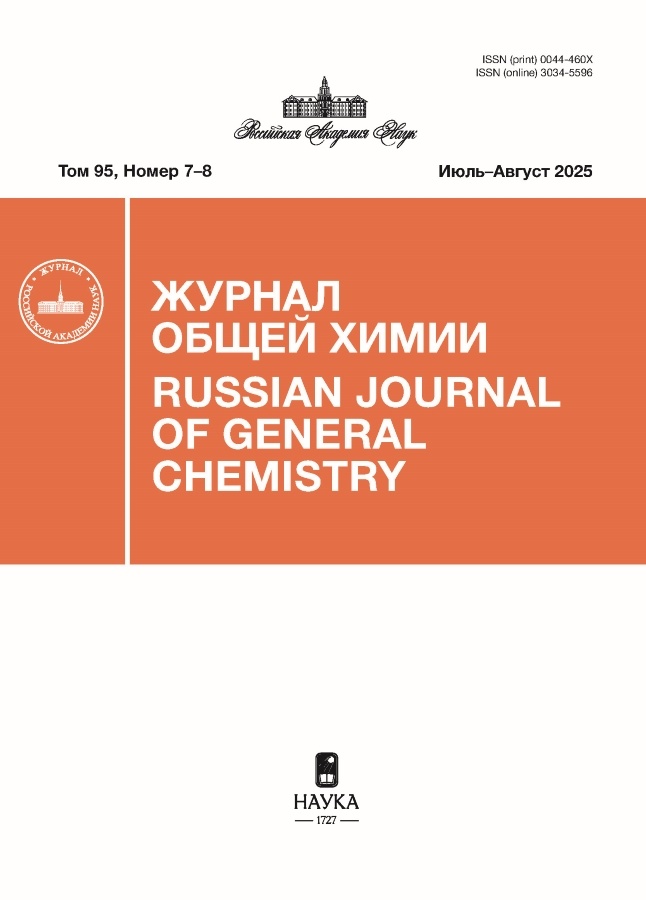Журнал общей химии
ISSN (print): 0044-460X
Учредитель: Российская академия наук
Главный редактор: Синяшин Олег Герольдович, академик РАН, д-р хим. наук, профессор
Периодичность / доступ: 12 выпусков в год / подписка
Входит в: Белый список (2 уровень), перечень ВАК, РИНЦ
Свидетельство о регистрации СМИ: ПИ № ФС 77 – 66719 от 28.07.2016
Журнал общей химии (ЖОХ) является одним из крупнейших российских научных журналов, отражающих основные направления развития химии. ЖОХ является преемником первого российского химического журнала "Журнал русского химического общества", основанного в 1869 году для освещения исследовательской и научно-общественной деятельности русских химиков. На его страницах впервые были напечатаны труды классиков русской химии, в частности работы Д. И. Менделеева по созданию и развитию периодической системы элементов и А. М. Бутлерова, связанные с разработкой его теории строения органических соединений; исследования Н. А. Меншуткина, Д. П. Коновалова, В. Ф. Алексеева, Н. С. Курнакова, А. А. Яковкина, В. А. Кистяковского, Л. А. Чугаева в области неорганической и физической химии; В. В. Марковникова, Е. Е. Вагнера, А. М. Зайцева, С. Н. Реформатского, А. Е. Фаворского, В. Е. Тищенко, М. И. Коновалова, Н. Д. Зелинского, С. В. Лебедева, А. Е. Арбузова в области органической химии.
В настоящее время журнал публикует работы, посвящённые актуальным общим вопросам химии и проблемам, возникающим на стыке различных разделов химии, а также на границах химии и смежных с ней наук (металлоорганические соединения, элементоорганическая химия, органические и неорганические комплексы, механохимия, нанохимия и т. д.). Наряду с оригинальными научными статьями в Журнале общей химии публикуются итоговые обзоры, дискуссионные статьи, краткие предварительные сообщения о новейших научных достижениях, требующие срочной публикации для закрепления приоритета и представленные в форме писем в редакцию и сообщения по материалам научных конференций. Журнал представляет интерес как для исследователей, осуществляющих научно-исследовательскую деятельность в области химии, так и специалистов, работающих в различных областях химической промышленности.
Текущий выпуск
Том 95, № 7-8 (2025)
Статьи
Синтез и строение диэтил-2-[(арил)(морфолино/пиперидин-1-ил)метил]\nмалонатов
Аннотация
Трехкомпонентной реакцией диэтилмалоната с ароматическим альдегидом, морфолином или пиперидином при кипячении в этаноле в течение 4 ч получены диэтил-2-[(арил)(морфолино/пиперидин-1-ил)метил]малонаты. Структура полученных соединений установлена методами ЯМР 1Н, 13С спектроскопии и рентгеноструктурного анализа.
 240-244
240-244


Синтез и биологическая активность 1-гидроксиэтил- и 1-(4-гидроксифенил)- 5-арил-4-ароил-3-пирролин-2-онов
Аннотация
Взаимодействием метиловых эфиров ароилпировиноградных кислот с ароматическими альдегидами и этаноламином или п-аминофенолом синтезирован ряд новых 1-(2-гидроксиэтил)- и 1-(4-гидроксифенил)-5-арил-4-ароил-3-гидрокси-3-пирролин-2-онов. Изучена противомикробная и антиноцицептивная активность полученных соединений.
 245-255
245-255


Синтез 1,3-диметилпиримидо[4′,5′:4,5] пирроло[1,2-b] пиридазин-2,4(1H,3H)-дионов и их 8,9-дигидропроизводных
Аннотация
Разработаны простые эффективные методы синтеза ранее не описанных замещенных пиримидо[4′,5′:4,5]пирроло[1,2-b]пиридазин-2,4(1H,3H)-дионов и их 8,9-дигидропроизводных. Изучено их строение с применением ИК, ЯМР, УФ спектроскопии, квантово-химических расчетов и рентгеноструктурного анализа.
 256-268
256-268


Тиоцианатные производные изоборнилфенолов: синтез и антиоксидантная активность
Аннотация
Синтезированы новые оригинальные молекулы изоборнилфенолов, содержащие тиоцианатную группу. Установлено, что на селективность реакции нуклеофильного замещения существенное влияние оказывают такие структурные факторы, как природа галогенида и длина алифатического линкера. В случае 2,6-диизоборнил-4-бромометилфенола тиоцианат получен при 0°С. Для изоборнилфенолов с пропильным линкером тиоцианаты синтезированы при кипячении в соответствующем растворителе. Полученные тиоцианатные производные изоборнилфенолов могут рассматриваться как перспективные ингибиторы окислительных процессов ввиду наличия в их структуре нескольких реакционных центров.
 269-279
269-279


ПРЕДОРГАНИЗОВАННЫЕ АМИДНЫЕ ЛИГАНДЫ НА ОСНОВЕ РЕЗОРЦИНКАЛИКС[4]АРЕНОВ
Аннотация
Исчерпывающей функционализацией rccc-тетра-С-фенетилрезорцинкаликс[4]арена синтезированы новые модифицированные производные, содержащие 8 терминальных амидных фрагментов и различающиеся компонентами и размером спейсеров, соединяющих их с макроциклическим остовом, а также природой амидных групп. С использованием УФ спектроскопии изучены акцепторные способности амидных резорцинаренов по отношению к катионам металлов в гетерогенных и гомогенных условиях. Проиллюстрировано влияние предорганизации макроциклического остова лиганда на его способность к комплексообразованию с катионами металлов.
 280-297
280-297


Синтез и оценка антибактериальной активности циклопропилфосфонатов
Аннотация
Взаимодействием (О,О-диэтил)(1,2-дибромэтил)фосфоната с СН-кислотами, в частности, с ацетилацетоном, ацетоуксусным и малоновым эфирами, этиловым эфиром, амидом циануксусной кислоты и бензилцианидом, в присутствии основания в ацетонитриле при комнатной температуре получены фосфонилзамещенные циклопропаны. Изучена антибактериальная активность исходного фосфоната и полученных производных.
 298-304
298-304


Квантово-химическое изучение взаимодействия мочевины с этиленгликолем при катализе лактатом цинка
Аннотация
Квантово-химическим методом функционала плотности B3LYP изучена реакция мочевины с этилен- гликолем с образованием этиленкарбоната, катализируемая лактатом цинка. Взаимодействие протекает в две стадии. На первой стадии образуется 2-гидроксиэтилкарбамт, который на второй стадии трансформируется в этиленкарбонат и аммиак. Первая стадия является скоростьлимитирующей. Выявлено четыре независимых маршрута образования 2-гидроксиэтилкарбамат. В процессе его образования принимают участие как мономерные, так и димерные молекулы гликоля. Кинетически и термодинамически более выгодными являются маршруты с участием димерных молекул гликоля. В катализируемой лактатом цинка трансформации 2-гидроксиэтилкарбамата в этиленкарбонат эффективным сокатализатором выступает этиленгликоль. Данная стадия является существенно обратимой. Использование сверхстехиометрических количеств этиленгликоля, применение повышенных температур, удаление аммиака из реакционной среды являются факторами, позволяющими успешно получить этиленкарбонат гликолизом мочевины в условиях катализа лактатом цинка.
 305-318
305-318


Новый подход к синтезу наноразмерных порошков карбоната бария
Аннотация
Разработан новый подход к синтезу высокодисперсного карбоната бария с заданными характеристиками (насыпная плотность от 0.015 г/см3, размер частиц в диапазоне 13–142 нм, изометрический габитус), заключающийся в последовательной термической обработке до 1100℃ концентрированного водно-углеводного раствора Ba(NO3)2 и D-C6H12O6. Исследованы процессы фазообразования карбоната бария в интервале используемых температур (350–1100°С). С помощью физико-химических методов исследования (ИК спектроскопии, рентгенофазовый анализ, просвечивающая электронная микроскопия, сканирующая электронная микроскопия), а также химического анализа охарактеризованы основные этапы синтеза BaCO3.
 319-328
319-328


Синтез наноструктурированных алюмосиликатов с различным соотношением SiO2/Al2O3: анализ состава, морфологии, ИК и ЯМР спектров
Аннотация
В работе представлены данные по синтезу наноструктурированных алюмосиликатов (цеолитов) натриевой и калиевой форм с мольным соотношением SiO2:Al2O3 = 2–10 из водных растворов при температуре не выше 95°С. Приведены результаты исследований элементного состава, морфологии наночастиц, удельной поверхности полученных рентгеноаморфных алюмосиликатов, получены и проанализированы инфракрасные спектры и спектры ядерного магнитного резонанса.
 329-342
329-342


Коррозионно-электрохимическое поведение и модификация поверхностных слоев углеродистой стали в водных средах, содержащих никелевый комплекс нитрилотрисметиленфосфоновой кислоты
Аннотация
Методами хроновольтамперометрии, рентгеновской фотоэлектронной спектроскопии и сканирующей электронной микроскопии поверхности с микроанализом изучено влияние хелатного комплексного соединения Na4[NiN(CH2PO3)3]‧11H2O на состав, концентрационный профиль поверхности и коррозионно-электрохимическое поведение стали 20 в среде боратного буферного раствора при pH = 7.4. Исследованное соединение обладает свойствами ингибитора коррозии, причем наилучший защитный эффект достигается при его концентрации 0.5 ммоль/дм3. Замедление анодного растворения железа обусловлено формированием на поверхности стали легированного никелем слоя оксидов Fen–xNixOm толщиной 10–20 нм.
 343-354
343-354












